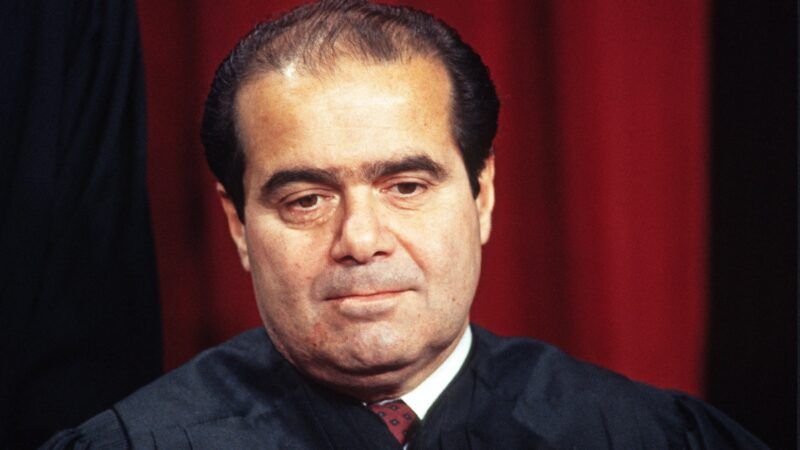Trump's Favorite Justice Was One of Those 'Stupid People' Who Think Flag Burning Is Protected Speech
Antonin Scalia twice joined Supreme Court decisions rejecting bans on that particular form of political expression.

During a presidential debate in 2016, Donald Trump described the late Supreme Court Justice Antonin Scalia as a "great judge" and promised to "appoint judges very much in the mold of Justice Scalia." Trump may not have realized that Scalia was one of those "stupid people" who think flag burning is protected by the First Amendment.
Last week, as Reason's Emma Camp noted, the former president said people who burn U.S. flags (even ones they own) should go to jail. He was reiterating a position that he took in November 2016, a month after the debate in which he praised Scalia. "Nobody should be allowed to burn the American flag," Trump tweeted back then. "If they do, there must be consequences—perhaps loss of citizenship or [a] year in jail!"
Asked about the comment on CNN, Trump spokesman Jason Miller denied that such a policy would be unconstitutional. Flag burning "is terrible and it's despicable," Miller said. "It absolutely should be illegal."
In an interview with Fox and Friends last Wednesday, Trump likewise dismissed the argument that flag burning is a form of constitutionally protected expression. "You should get a one-year jail sentence if you do anything to desecrate the American flag," Trump said. "Now, people will say, 'Oh, it's unconstitutional.' Those are stupid people. Those are stupid people that say that."
Those "stupid people" include Justice William Brennan, who wrote the majority opinion in the 1989 case Texas v. Johnson, which rejected the prosecution of Gregory Lee Johnson for burning a U.S. flag during the 1984 Republican National Convention in Dallas. They also include Scalia, who joined that opinion along with Justices Anthony Kennedy, Thurgood Marshall, and Harry Blackmun.
Scalia took the same position in the 1990 case U.S. v. Eichman. That decision overturned the Flag Protection Act of 1989, which Congress passed in response to Johnson.
"We are aware that desecration of the flag is deeply offensive to many," Brennan said, again writing for the majority. "But the same might be said, for example, of virulent ethnic and religious epithets, vulgar repudiations of the draft, and scurrilous caricatures [all of which the Court had deemed protected by the First Amendment]. 'If there is a bedrock principle underlying the First Amendment, it is that the Government may not prohibit the expression of an idea simply because society finds the idea itself offensive or disagreeable.' Punishing desecration of the flag dilutes the very freedom that makes this emblem so revered, and worth revering."
Scalia later cited the flag-burning cases to illustrate how his textualist approach to constitutional interpretation sometimes led him to rule against his personal inclinations. "If it were up to me, I would put in jail every sandal-wearing, scruffy-bearded weirdo who burns the American flag," he said in a 2015 speech. "But I am not king."
Scalia's distinction between what the Constitution requires and what he might otherwise prefer probably would be lost on Trump, who seems to value freedom of speech only to the extent that it protects him and his allies.


Show Comments (76)